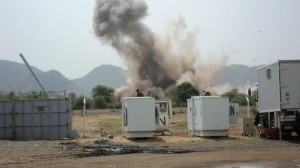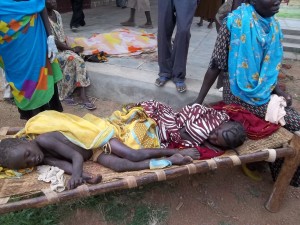Demonstrating the kind of religious tolerance for which it is famous, the Government of Sudan demolished a church on Monday, June 18, 2012. For almost a year now, since the secession of South Sudan from the country to become the Republic of South Sudan, the climate for Christians in the north has become increasingly hostile. The Islamist National Congress Party government of ICC-indicted war criminal President Omar al Bashir has indicated, not gently, that Christians and Southern Sudanese in general, are not welcome in the Islamic Republic of Sudan. Sudan is now to be a pure Islamic state, governed by Sharia: “One religion, one language, and one culture.”
The tricky thing is that there are still tens of thousands of Christians in Sudan. Some of them are refugees from the South who are hoping to return to their homeland but have no prospects for livelihood when they do. Some of these Southerners have lived in the north their whole lives — they have no familiarity with the South at all. Some of the Christians are not Southerners at all. They are northern Sudanese whose situation is even more precarious, since they are considered apostates to Islam if they have converted to Christianity. And many of all of these Christians are Episcopalians, members of the Episcopal Church of Sudan. After the Roman Catholic Church, the Episcopal Church is Sudan’s largest.
As part of its message to Christians that they are not welcome in Sudan, on 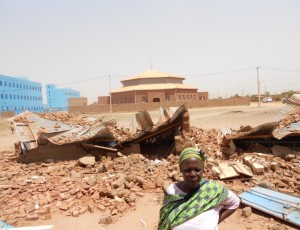 Monday, June 18, the local Khartoum government’s Ministry of Planning and Housing sent a couple of trucks, a bulldozer, and a cars full of police to the Parish Church of St. John in Haj Yousif, a Southern Sudanese refugee settlement in Khartoum and reduced the church to rubble. The cars appeared without warning and surrounded the church. Some of the women church members who were present asked to remove the church’s property before the church was destroyed, but they were only given enough time to retrieve a few chairs. The authorities arrested three young people who were taking pictures of the demolition, and they were held for some hours before being released.
Monday, June 18, the local Khartoum government’s Ministry of Planning and Housing sent a couple of trucks, a bulldozer, and a cars full of police to the Parish Church of St. John in Haj Yousif, a Southern Sudanese refugee settlement in Khartoum and reduced the church to rubble. The cars appeared without warning and surrounded the church. Some of the women church members who were present asked to remove the church’s property before the church was destroyed, but they were only given enough time to retrieve a few chairs. The authorities arrested three young people who were taking pictures of the demolition, and they were held for some hours before being released.
According to the Rt. Rev. Ezekiel Kondo, the Bishop of Khartoum, Christians had been meeting as the Church of St. John in Haj Yousif since they were first “settled” in the barren desert area by the Khartoum regime in 1987/1988. The Southerners were given nothing by the Khartoum regime to help them survive, let alone have a church building.
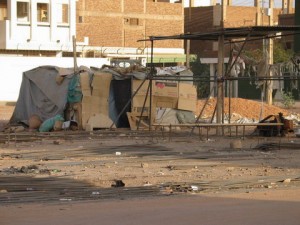
South Sudanese who fled north to Khartoum during the war received nothing but misery from the National Islamic Front regime (now known as the National Congress Party).
Kondo says that eventually, after some years in which the people were living in cardboard shacks, the government surveyed the area and people were allotted plots for building more permanent living structures. Several times, the people requested land upon which to build a place to worship, but the government did not allot the church a piece of land. Eventually the Christians saved enough money and built the Church of St. John on the unused, desert land anyway.
In a statement released on June 19, 2012, the day after the destruction, Bishop Kondo said the government authorities said that the church was demolished because it had no legal documents or status and because the church “belongs to Southerners, and since they have got their own independence, they should not be there.” He added that some of the authorities demanded, “If you wanted to be in Khartoum why did you vote for separation?” (It is almost amusing how many northern Sudanese appear surprised and offended that the people that they think of as “slaves” and “infidels,” and do not treat like human beings should want freedom and dignity in a nation of their own!)
Kondo, who has been defending and fighting for the rights of the Church and for Sudan’s Christians for his entire life as a church leader, responded that the government had been refusing to give legal status to the church for the last 25 years. He said that it was evident that the Sudanese government did not respect the rights of non-Muslims. The church does not belong to South Sudanese, he said. It is part of the Episcopal Church of Sudan, and he, the bishop of the Khartoum diocese, is a Sudanese, not a South Sudanese. Kondo “strongly protested against the unjust action taken by the government local authority of Shereq El Nail” and he asked “for due compensation of all the destroyed items of the church.” He also requested that “the government of Sudan to allot a plot of land for this church so as to let the Christians of this area carry out their worship.”
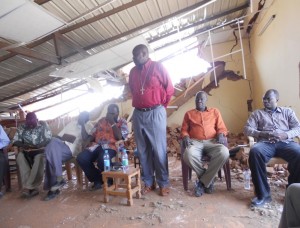
The Rt. Rev. Ezekiel Kondo, Bishop of Khartoum, comforts his pastors in the church building wrecked by the Islamist government.
The feisty bishop reported that he had ordered the destructed church site to be left as it alone for five days while an inventory of the destroyed items is compiled. Kondo notified both the local and international media of the incident. He also informed both the state and federal branches of the Ministry of Religious Guidance and Endowments. This is not the first time that the Government of Sudan has demolished or confiscated church property, and it will surely not be the last. But the churches are blessed to have strong, courageous leaders like Ezekiel Kondo.





